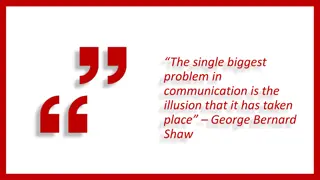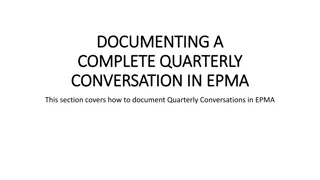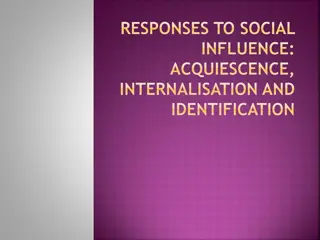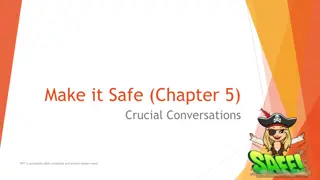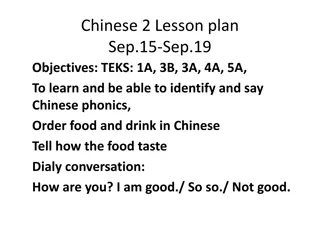Understanding Responses in Conversations
Explore the impact of different types of responses in conversations and habitual patterns of speech. Discover how our choices in conversations, even those with ourselves, can shape our self-concept and self-esteem. Learn about the components of the self-concept and how they influence our interactions with others.
Download Presentation

Please find below an Image/Link to download the presentation.
The content on the website is provided AS IS for your information and personal use only. It may not be sold, licensed, or shared on other websites without obtaining consent from the author. Download presentation by click this link. If you encounter any issues during the download, it is possible that the publisher has removed the file from their server.
E N D
Presentation Transcript
1 KINDS OF RESPONSES Choices We Make When We Converse And How They Affect Others James G. Clawson Darden GSB, UVA 1
2 Habitual Patterns in Conversation When we converse, we often fall into patterns of speech, using over and over again the same kinds of responses to the comments of others. These habits may or may not be productive in the conversation, especially as we attempt to influence others. Actually, we have lots of options as to how we ll respond to comments from others. Once we re aware of these options and have some skill in composing them, we can choose how we respond. As we gain skill with various options, we develop judgment as to which responses fit which situation. This exercise is designed to help you expand your repertoire of responses and make it more conscious. 2
3 The form of conversation Conversation or discussion necessarily involves two or more people. Conversations with our selves we term soliloquies and these turn out to be very important in the formation of one s self concept, however, that is a topic for another time. Note though, that even in soliloquy we have choices. And understanding those choices is a significant part of therapy. (e.g. see Albert Ellis A Guide to Rational Living, and William Glasser, Choice Theory) 3
4 Action -- Reaction So conversations imply statements made by two or more people. I speak, Other responds Other speaks, I respond Repetitively 4
5 When we converse We initiate with a comment or respond to the comment of another. We have choices in those interactions of which many, if not most, are not aware. Our choices are usually shaped heavily by our past experiences and habits of speech. Speech is closely related to and springs from our self concepts. 5
6 The Self Concept What do you think of yourself? How do you think about yourself? Research over the decades concludes that above all else, people want to think well of themselves. That is, they want to have high self esteem yet many don t. People tend to be responsive to things that enhance their self concepts. People tend to be defensive against things that attack their self concepts. 6
7 Parts of the Self Concept We can think of the self concept as having three main parts: Ideal Self (IS): what you think you SHOULD be. Self Image (SI): what you think you ARE. If the gap between the IS and the SI is narrow, we tend to think well of ourselves. If the gap between the IS and the SI is wide, we tend to think poorly of ourselves. The gap between the IS and the SI affects our self esteem (SE). 7
8 Diagram of the Self Concept IDEAL SELF SELF IMAGE GAP? WANT GOT SELF ESTEEM 8
9 Defensiveness Everyone wants to feel good about themself When a person is in a defensive mode, protecting his or her self concept, he or she is less open to influence. Skilled conversationalists are adept at keeping defensive barriers low both in the Other and in Self. 9
10 People will protect their self concepts against disconfirming data by using Denial: the data are not true Projection: attributing personal characteristics on others. Preoccupation: focus on my own situation Distortion: changing the data Ignoring/Suppressing: not recognizing the data And more 10
11 Confidence At a deep level, defensiveness arises from a lack of self confidence. That is, it is only when Other s opinions of Self are valuedthat Other s opinions have power to injure. The VABE underlying low self esteem is often a variation of THEYknow better than I do, even about me. When one is conversing with Other, an ability to sense Other s self confidence is useful in determining what response to use. 11
12 Ally or Adversary? In conversation you can either help protect others self concepts and become an ally Or you can attack their self concepts and become an adversary If you attack, knowingly or unknowingly, you create defensiveness. Be careful to note which way the scales are tipping ADVERSARY ALLY 12
13 Help or Hinder? People evaluate in micro-seconds every choice you make in a conversation: Helpful? Hurtful? Ally? Adversary? Every choice we make in a conversation shapes the way others see you and themselves. You can decide how you want to be seen and what impact you wish to have on others. 13
14 One of the primary choices we make in conversations is how much we want to direct or guide the discussion. Consider the varieties of responses along a continuum of direction. 14
15 Variation of Direction DIRECTIVE Commands: giving orders Persuasion: using logic Advice: attempting to set a direction Questioning: controlling the conversation Giving feedback: offering opinions with or without solicitation Directive probing: manipulation Role playing: pretending Summarizing: attempting to find conclusions (yours) Self-disclosing: revealing information about self Exchanging: reciprocating data disclosure Problem-solving: attempting to find solutions Continuances: um, you know, uh-huh, Silence: Reflective listening: mirroring content and emotion NON-DIRECTIVE 15
16 Another view: Five Response Options as seen by Budd and Rothstein (You are what you say) Requests (invitations) Promises (commitments) Declarations (statements of fact opinion) Assessments (evaluations, judgments) Assertions ( shoulds based on VABEs) 16
17 PITFALLS IN CONVERSATION: Ten Linguistic Viruses Do you do any of these? How often? fromYou are what you say p. 141 Not making requests Living with uncommunicated expectations Making unclear requests Not observing the mood of requesting Promising when you re not clear what was requested Not declining requests Breaking promises, undermining trust Treating assessments as truth Making assessments without good data 10. Making fantasy affirmations and declarations 1. 2. 3. 4. 5. 6. 7. 8. 9. 17
18 Varieties of Responses Condensed There are lots of ways of defining our conversation/response options. For simplicity, let s consider the seven responses defined below. This is not an exhaustive list of the kinds of responses you might use, but it presents a broad, useful distillation of the options we have in conversation. Read the definitions and be sure you have the distinctions among them in mind. 18
19 Kinds of Responses for Tactical Leadership Advice: You should . Questions: What ? Evaluations: is bad. Interpretations: You still need .. Preoccupation: I m feeling Sympathy: You poor thing. Empathy/Reflection: I hear content and emotion. 19
20 ADVICE An attempt to solve the speaker s problem. Skill in giving advice is a matter of insight and timing. Attempts to give advice prematurely are often met with resistance. Advice more broadly and for our purposes here also includes INSTRUCTIONS, COMMANDS, and REQUESTS. As a basic rule of thumb, remember that only the individual can solve his or her own problems. Ultimately the other person has to conclude what needs to be done. If we re not in a problem solving mode, then advice, instructions, commands, or requests may be appropriate. e.g. You should quit and take a new job. 20
21 QUESTION An attempt to gain more information based on the interests of the listener/asker. Questions may or may not be helpful to the speaker, but they are invariably based on what the listener feels is important and, therefore, tend to shift leadership in the discussion to the listener. Questions are, therefore, a directive approach. e.g. Why were you doing that anyway? How old were you then? Did you think about leaving? 21
22 EVALUATION A value judgment about what has just been said. Evaluations may be explicit or implied. Both positive and negative evaluations tend to make the speaker defensive since the speaker concludes that the listener is in a judging mode. Evaluations are based on applying what others say to our own VABE set. e.g. That wasn t helpful, was it? That was a stupid thing to say. You aren t being very sensitive. 22
23 INTERPRETATION A guess about the motives or personality of the speaker. Interpretations are dangerous because they are often incorrect, and because, even when correct, the speaker may not be ready to recognize or accept them. They go beyond what is expressed by the speaker. E.g. He s a mama s boy. She s a narcissist. You ve got self-esteem issues. 23
24 PREOCCUPATION Gestures of communication offered when the listener is really thinking about something else perhaps even his/her next response. When someone says, I know exactly what you mean, it s a sure sign that they are preoccupied with their OWN experience, not the speaker s. e.g. I know exactly what you mean. I had the same experience. ummm, I need to go now. Did you see the Redskins game last night? 24
25 SYMPATHY An attempt to ease the emotional state of the speaker. Sympathy can create a false perception that the listener supports the speaker and his or her views and may contribute to an avoidance of the real issues. e.g. I m so sorry. You poor thing. Isn t that awful? Let me give you a hug. 25
26 EMPATHY/REFLECTION A genuine attempt to communicate listener s non- judgmental awareness of the speaker s content and emotion. Reflections tend to build understanding and trust between conversants, but also have three potential pitfalls: - under-reaching or parroting, - overreaching or interpreting, and -overuse. E.g. So you want to leave but are conflicted about it, yes? You like the offer and at the same time you re wondering if something better won t come along I hear a careful analysis AND lingering discontent or confusion about the apparent answer. 26
27 Practice, practice, practice Consider these various types of conversation and begin practicing recognizing them in regular speech. There are three levels of skill that we will be targeting: recognition, use, and judgment about when to use. 1. 2. 3. At first this practice may seem awkward, but the more you become familiar, the easier and faster and more natural it will become. Like exercising a muscle. 27
28 Try to categorize the statements on the left below. For each one, make your choice and then click to see if your assessment was correct. STATEMENT CATEGORY You should go to all of the company briefings. ADVICE Why did you go? QUESTION Uh huh. I heard a great joke last week. PREOCCUPATION You re feeling torn between marketing and sales? EMPATHY/REFLECTION You poor thing. What can a person do? SYMPATHY Don t be so lazy. Go home and get dressed and go! EVALUATION & ADVICE 28
29 SPEAKER 1 (Woman, 27) "I m concerned about what to do. My husband is looking for a job, too, and it looks like his best opportunities are on the West Coast. But my family lives in New Jersey, and I d like to be close to them. And my best offer, my dream job, really, is in the same area. So, I m not sure what to do. What should I say to my husband? RESPONSES TO SPEAKER 1 1. What is your next step? 2. You seem a little selfish to me. 3. Staying close to your family is your most important value, isn t it? 4. You should think about other people more. It will help you in the long run. 5. Ooooh! Don t worry! It will turn out all right! 6. Uh, huh. Did you see the ball game last night? 7. It sounds like you feel torn between your family, your job offer, and your husband and can t see yet how to balance all three. QUESTION EVALUATION INTERPRETATION ADVICE SYMPATHY PREOCCUPATION EMPATHY/ REFLECTION 29
30 SPEAKER 2 (Man, 30) "You know, things haven t turned out quite like I expected them to. I thought with my degree, I d have very interesting work and feel excited about going in every day. But I m getting bored, much faster than I thought I would. And you have to wait for people to let go of their old ideas. And some of them may never let go. I thought the right answers would be worth more. Now I wonder if I did the wrong thing. RESPONSES TO SPEAKER 2 1. You seem to feel a bit betrayed that the job didn t turn out like you thought it would. Things aren t moving as fast as you d like them to. 2. Why don t you set up a series of lunches with these older people and use that develop more influence? 3. You're acting like such a quitter. 4. You don t seem to trust your ability to make good decisions 5. What do these older people hold on to so tightly? 6. Bummer, huh? The older generation of managers is really out of touch! 7. Yeah. I know exactly what you mean. I ve got this boss who acts like he was born during the Jurassic Era. He has no clue. INTERPRETATION ADVICE EVALUATION EMPATHY/REFLECTION QUESTION SYMPATHY PREOCCUPATION 30
31 SPEAKER 3 (Woman, 28) "I have this job offer, and it s a good one, don t get me wrong. But it s not exactly what I d hoped for. It s going to be very demanding, but not exactly what I d wanted. I m a little scared about it. Maybe because I m not sure it s what I really want to do. But I don t have any other offers right now, and the season is closing fast. RESPONSES TO SPEAKER 3 1. Ooh, don t be scared! You can do it! I know you can! 2. You don t seem too scared. I remember when we were hiking once, and we saw a grizzly bear. That s when you get scared! 3. So, how long will you wait before you make a decision? 4. Don t be so greedy! Life doesn t always give you just what you want! 5. So, you re glad to have an offer, and not only is it a little scary, but also not quite what you wanted, and you are wrestling with whether or not you should take it and look for something else? 6. You seem like you're more interested in security than in growing rapidly. 7. You should tell them No, and look for the exact thing you want. Life s too short! SYMPATHY PREOCCUPATION QUESTION EVALUATION EMPATHY/REFLECTION INTERPRETATION ADVICE 31
32 SPEAKER 4 (Man, 32) "It s so frustrating working for our boss. He s involved in everything, from what color the tiles in the bathrooms are to how our presentation slides should look. He s done a great job here, and built this company on the sheer strength of his personality, but I m tired of the browbeating and walking around on eggshells. I don t think it s the right thing for the future of the company, but still, look at what he s done so far. I m not sure if I want to stay here even as successful as the company is. RESPONSES TO SPEAKER 4 Compose your own responses according to the types below. Share your compositions with your triad partner(s) for confirmation and discussion. 1. (Reflection) 2. (Advice) 3. (Evaluation) 4. (Sympathy) 5. (Preoccupation) 6. (Interpretation) 7. (Question) 32
33 SPEAKER 5 (Woman, 35) I am so excited about my new business! I ve just started this first store, and although sales haven t been what I hoped they d be just yet, I m sure we can get to eight stores in two more years. I ve got contacts in all eight cities, and I m sure the markets will love my idea! If I can get four more major investors and find two more really talented and capable people, we re rolling! RESPONSES TO SPEAKER 5 Compose your own responses according to the types below. Share your compositions with your triad partner(s) for confirmation and discussion. 1. (Sympathy) 2. (Reflection) 3. (Advice) 4. (Preoccupation) 5. (Evaluation) 6. (Question) 7. (Interpretation) 33
34 This exercise was designed to Make you more aware of the choices you can make in conversation with others Help recognize those choices more readily Help your begin to gain skill in forming those responses quickly Show you how the self-concept is an integral foundation to speech quality Help you see that mistakes in conversation create defensiveness just as much as bad intentions. 34
35 I invite you to continue practicing Looking for and becoming more aware of the variety of responses people use in their speech Observing the impact or consequences of those choices on the willingness of the Other to be influenced Choosing more carefully how you speak in order to shape the responses (or buy-in) of the Other 35
36 End of Kinds of Responses Exercise 36



